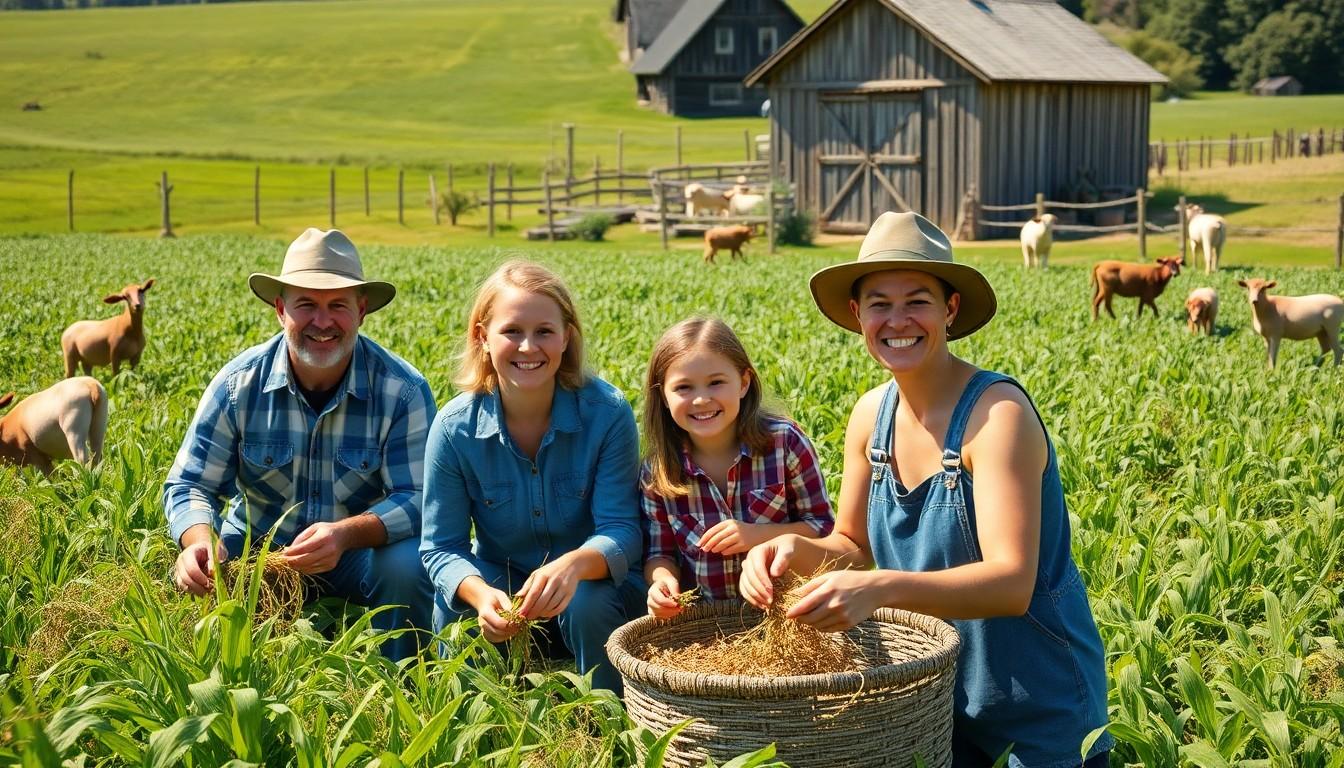Imagine swapping your city skyline for sprawling fields of corn and sunflowers. Welcome to agritourism, where farms roll out the welcome mat for visitors eager to experience the rural charm and fresh air. It’s not just about picking apples or petting goats; it’s a delightful blend of agriculture and tourism that offers a taste of farm life while supporting local economies.
Agritourism Definition and Example
Agritourism combines agriculture and tourism, offering unique experiences for visitors to engage with rural life while supporting local economies. This concept allows individuals to connect with food sources and farming practices more intimately.
What Is Agritourism?
Agritourism encompasses various activities that allow visitors to explore and participate in farm operations. It includes crop tours, wine tastings, farm stays, and workshops. With this model, farmers share their knowledge and practices, creating memorable experiences for guests. Engaging with farm activities helps visitors appreciate agricultural processes firsthand.
Key Features of Agritourism
Key features of agritourism include educational opportunities, hands-on experiences, and the promotion of local products. Educational opportunities often arise from guided tours or interactive workshops that cover topics like sustainable farming practices. Many agritourism ventures emphasize hands-on experiences, allowing guests to partake in harvesting crops or animal care. Supporting local businesses is essential, as this practice fosters economic growth in rural areas and strengthens community ties.
Types of Agritourism

Agritourism encompasses diverse experiences that connect visitors with agricultural practices. Each type provides unique engagement with rural life.
Farm Stays
Farm stays offer guests the chance to live on a working farm. Visitors often participate in daily activities such as feeding animals or harvesting crops. These immersive experiences provide insight into farm operations and the agricultural lifestyle. Many farm stays also feature cozy accommodations, allowing travelers to enjoy peaceful rural settings. Guests frequently enjoy home-cooked meals made from farm-fresh ingredients, enhancing their connection to the land.
Educational Experiences
Educational experiences enhance visitors’ understanding of farming practices. Workshops cover topics like organic gardening or cheese-making. Participants often engage in hands-on activities that foster learning and appreciation for food production. Programs might also include guided tours that explain sustainable practices and environmental stewardship. These experiences enable guests to gain valuable knowledge while supporting local agriculture.
Farm Tours
Farm tours provide structured visits to various farms, showcasing crops and livestock. Guests often explore fields, orchards, or vineyards while guided by farm owners or staff. Informative narratives about the history and farming techniques add depth to the experience. Visitors usually enjoy tasting fresh produce or local products during these tours. Interactions with animals and demonstrations of farming equipment can further enrich the learning experience.
Benefits of Agritourism
Agritourism offers significant benefits, boosting local economies while fostering community connections.
Economic Advantages
Agritourism creates job opportunities in rural areas. Increased tourism generates revenue for farms, encouraging growth in local businesses. Visitors often purchase food products, crafts, or services, directly contributing to regional economies. Research shows that agritourism can increase farm income by 10% to 20%. Moreover, farms diversify income sources beyond traditional crops, providing greater financial stability. Visitors drawn to farm experiences may spend money on lodging, dining, and entertainment, further enriching local economies. The positive financial impact encourages more farms to engage in tourism, amplifying these economic benefits.
Community Engagement
Community engagement thrives through agritourism initiatives. Local residents often participate in events, workshops, or tours, strengthening neighborhood bonds. Agritourism programs foster collaboration among farmers, artisans, and businesses, promoting shared goals. By involving locals in planning and executing activities, a sense of ownership develops. Educational programs regarding sustainable practices also encourage community involvement. This engagement cultivates pride in local agriculture and enhances the overall visitor experience. Ultimately, agritourism nurtures a more connected and resilient community.
Examples of Agritourism
Agritourism encompasses a variety of hands-on experiences that connect visitors with farming practices. These experiences enhance understanding of agriculture while supporting local economies.
Successful Agritourism Ventures
Successful agritourism ventures often integrate unique activities that attract visitors. Farms offering wine tastings have seen increased foot traffic, allowing guests to sample local wines and learn about viticulture. Additionally, farms that host seasonal festivals draw crowds for events like harvest celebrations and pumpkin patches. Some properties provide guided farm tours, showcasing sustainable farming techniques and offering interactive activities such as berry picking. Such ventures not only diversify revenue streams but also create memorable experiences for guests.
Unique Agritourism Experiences
Unique agritourism experiences include engaging visitors through immersive activities. A standout example is a farm stay, where guests live and work on a functioning farm, gaining insights into daily operations. Workshops focused on cheese-making or organic gardening attract individuals interested in hands-on learning. A culinary class featuring farm-to-table meals enhances appreciation for local produce while boosting community engagement. Many farms also incorporate farm animals, allowing visitors to participate in milk or egg collection, which adds excitement and connection to farm life.
Challenges in Agritourism
Agritourism faces various challenges that impact its sustainability and growth. Understanding these obstacles is crucial for the sector’s improvement.
Environmental Impact
Agritourism may promote environmental concerns due to increased visitor traffic. Soil erosion can occur from heavy foot traffic on sensitive landscapes. Water management issues arise when farms increase usage to accommodate tourists. Wildlife disturbances happen as visitors explore areas that typically provide natural habitats. Sustainable practices must be prioritized to mitigate these negative effects, ensuring that agritourism supports both the environment and local ecosystems. Eco-friendly initiatives and responsible visitor guidelines help nurture the balance between tourism and agriculture.
Regulatory Concerns
Agritourism operations often encounter complex regulations. Zoning laws dictate where agritourism activities can occur, potentially limiting growth. Permitting processes may become lengthy, delaying new businesses from launching. Compliance with health and safety standards presents additional challenges for farm operators. Local governments often impose regulations on visitor numbers to preserve agricultural lands. Navigating these legal requirements can prove difficult, making advocacy for flexible policies necessary to support agritourism’s growth. Awareness of regulatory developments helps farmers adapt to changes while maximizing their agritourism potential.

